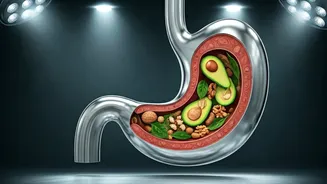Keto's Promises Explored
The ketogenic diet, popularly known as keto, involves drastically reducing carbohydrate intake while increasing fat consumption. Proponents claim it aids
weight loss, improves blood sugar control, and boosts energy levels. Essentially, the body is forced to switch from using glucose (from carbs) to ketones (from fat) for fuel. This metabolic shift, known as ketosis, is said to offer various health benefits. However, it's essential to understand that not all claims are scientifically validated. While some individuals may experience positive outcomes, others might face adverse effects. The effectiveness of the keto diet varies significantly from person to person. Considering individual health conditions and consulting a healthcare professional is crucial before embracing keto.
The Healthy Low-Carb Side
Focusing on the 'healthy side' of low-carb living means adopting a balanced approach that promotes overall well-being. This often involves prioritizing whole, unprocessed foods like vegetables, lean proteins, and healthy fats. It also means carefully monitoring carbohydrate intake to maintain stable blood sugar levels without completely eliminating essential nutrients. The key is to find a sustainable way of eating that supports individual needs and preferences. This might include moderate carb intake from nutrient-dense sources, such as fruits and whole grains, rather than a strict keto approach. This strategy helps individuals enjoy the benefits of low-carb eating while minimizing potential drawbacks like nutrient deficiencies or digestive issues. This includes recognizing the importance of fiber and incorporating it to aid digestion and promote overall gut health.
Risks During Treatment
Making radical changes to your diet, such as starting a keto diet, can be risky, especially if you are undergoing medical treatment. The body responds differently during treatment phases, and introducing a diet that significantly alters metabolism might lead to unexpected interactions with medications or affect the treatment's efficacy. If you are taking any medication or undergoing any medical treatment, it's critical to consult your doctor or a registered dietitian before making significant dietary changes. A healthcare professional can assess your individual health status, provide guidance based on your specific medical condition, and help you create a safe and effective plan. This ensures your dietary choices align with and support your treatment plan, minimizing potential risks and optimizing your health outcomes.
Fat and Cancer Risk
When considering the keto diet, it is important to understand the role fat plays, especially in relation to conditions like breast cancer. Not all fats are created equal; some, like saturated fats and trans fats, may increase health risks, while others, like unsaturated fats, may have positive impacts. The keto diet typically emphasizes a high intake of fats, making it crucial to choose healthy fats. Scientific studies are still examining the direct impact of the keto diet on cancer risk. Some research suggests that cancer cells can use fat as fuel for growth and survival. However, the exact interplay between the keto diet and cancer remains complex and not fully understood. Consulting with a healthcare professional is essential to understand how the keto diet could affect cancer risk and treatment options.
Fueling Cancer Cells
Research suggests that some cancer cells can use fat as a primary source of energy, potentially promoting tumor growth and spread. This concept is particularly relevant for the ketogenic diet, which relies heavily on fat consumption. In the context of cancer, this raises concerns about whether a high-fat diet could potentially exacerbate the disease. However, the relationship between diet and cancer is multifaceted. Many other factors influence cancer development and progression. The role of the keto diet in cancer is still under investigation, and more research is needed to determine how it might affect various types of cancers. Dietary choices for individuals with cancer need to be made under the guidance of healthcare professionals who can provide specific recommendations based on individual needs and health conditions.
No Single Anti-Cancer Diet
There is no single diet that can effectively prevent or treat all cancers. A diet's efficacy depends on various factors, including the type of cancer, its stage, and the individual's overall health. While specific dietary patterns, such as the Mediterranean diet, have been linked to a reduced risk of certain cancers, there is no universally recommended 'anti-cancer' diet. Cancer treatment involves multiple approaches, including surgery, chemotherapy, radiation therapy, and targeted therapies. Dietary changes should complement these treatments and support the individual's well-being. The best approach involves personalized dietary guidance from healthcare professionals, emphasizing a balanced intake of nutrients, considering individual health needs, and focusing on supporting overall health during treatment.














